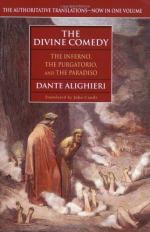“Creator, nor created being, ne’er,
My son,” he thus began, “was without love,
Or natural, or the free spirit’s growth.
Thou hast not that to learn. The natural still
Is without error; but the other swerves,
If on ill object bent, or through excess
Of vigour, or defect. While e’er it seeks
The primal blessings, or with measure due
Th’ inferior, no delight, that flows from it,
Partakes of ill. But let it warp to evil,
Or with more ardour than behooves, or less.
Pursue the good, the thing created then
Works ’gainst its Maker. Hence thou must
infer
That love is germin of each virtue in ye,
And of each act no less, that merits pain.
Now since it may not be, but love intend
The welfare mainly of the thing it loves,
All from self-hatred are secure; and since
No being can be thought t’ exist apart
And independent of the first, a bar
Of equal force restrains from hating that.
“Grant the distinction just; and it remains
The’ evil must be another’s, which is
lov’d.
Three ways such love is gender’d in your clay.
There is who hopes (his neighbour’s worth deprest,)
Preeminence himself, and coverts hence
For his own greatness that another fall.
There is who so much fears the loss of power,
Fame, favour, glory (should his fellow mount
Above him), and so sickens at the thought,
He loves their opposite: and there is he,
Whom wrong or insult seems to gall and shame
That he doth thirst for vengeance, and such needs
Must doat on other’s evil. Here beneath
This threefold love is mourn’d. Of th’
other sort
Be now instructed, that which follows good
But with disorder’d and irregular course.
“All indistinctly apprehend a bliss
On which the soul may rest, the hearts of all
Yearn after it, and to that wished bourn
All therefore strive to tend. If ye behold
Or seek it with a love remiss and lax,
This cornice after just repenting lays
Its penal torment on ye. Other good
There is, where man finds not his happiness:
It is not true fruition, not that blest
Essence, of every good the branch and root.
The love too lavishly bestow’d on this,
Along three circles over us, is mourn’d.
Account of that division tripartite
Expect not, fitter for thine own research.”
CANTO XVIII
The teacher ended, and his high discourse
Concluding, earnest in my looks inquir’d
If I appear’d content; and I, whom still
Unsated thirst to hear him urg’d, was mute,
Mute outwardly, yet inwardly I said:
“Perchance my too much questioning offends”
But he, true father, mark’d the secret wish
By diffidence restrain’d, and speaking, gave
Me boldness thus to speak: ’Master, my
Sight
Gathers so lively virtue from thy beams,
That all, thy words convey, distinct is seen.




